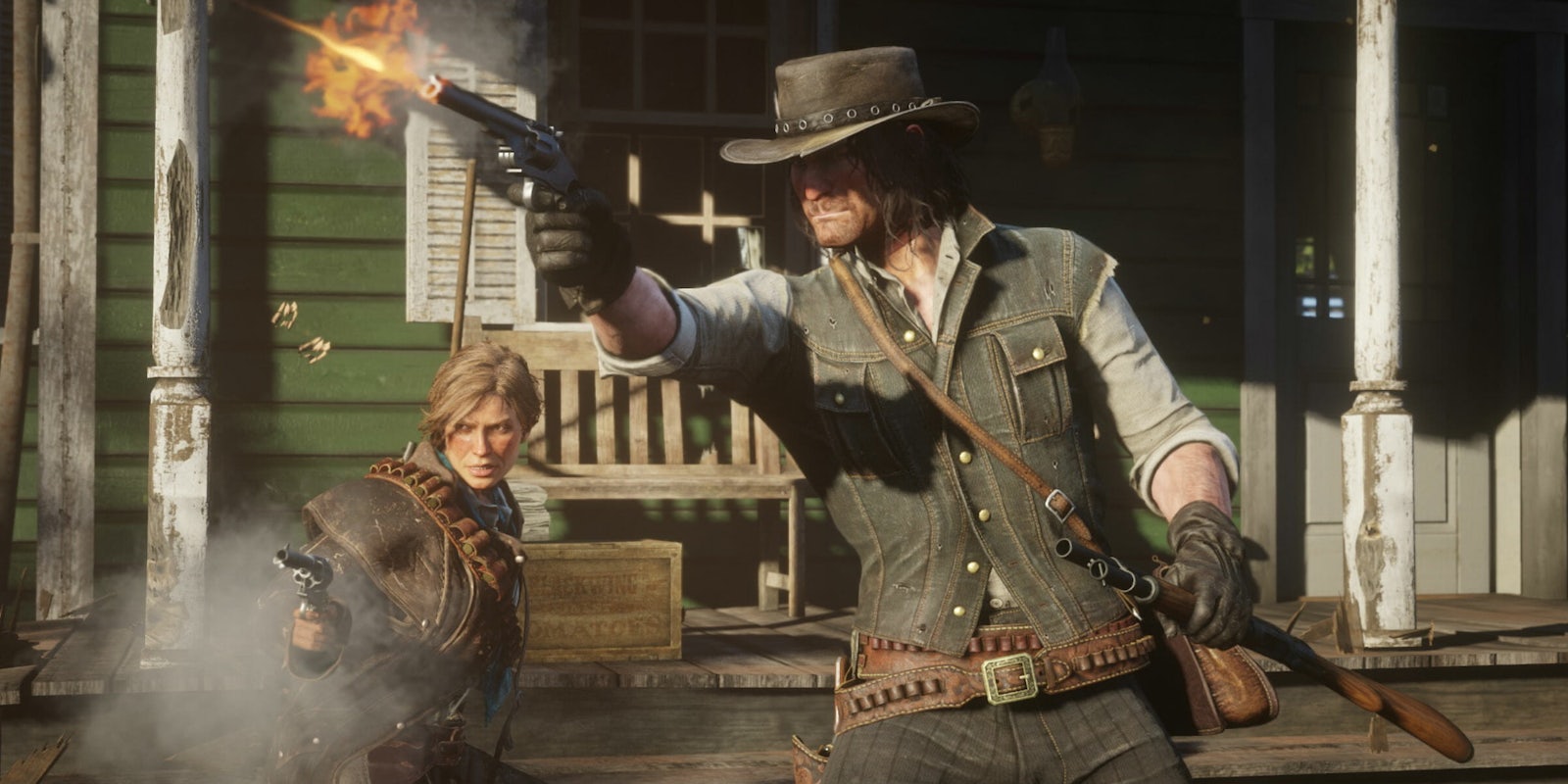The American West was built atop the broken bodies of Native American tribes, brave (if foolhardy) settlers, and cutthroats on both sides of the law. The visions of rugged cowboys, steam engine trains ripe for robbery, and an endless ocean of forest, desert, and plains came at a human cost. Red Dead Redemption 2 itself is no exception, if reports about punishingly lengthy working hours at developer Rockstar are to be believed. While no amount of big-sky country beauty can ever atone for the crimes of America’s past, and no amount of video game artistry can atone for labor malpractice, Red Dead Redemption 2 manages to evoke that same haunting beauty that has captured the hearts of millions since Manifest Destiny itself.
Whereas the original Red Dead Redemption was the tale of the outlaw cowboy’s last decade of relevance, reflected in dramatic technological advancements and the encroaching reach of G-men, Red Dead Redemption 2 is… well, still that, but about 15 years prior. Rather than hunting the remnants of Dutch van der Linde, you are the remnants, fleeing from the law after a botched robbery, carrying anything you can toss on the wagons and escaping to the snowy mountains of West Elizabeth. Through the eyes of Arthur Morgan, Dutch’s second-in-command and adopted ward, you’ll help lead this ragtag group of criminals across the lands in acts both heinous and heartening.
Perhaps the first question on everyone’s mind is how John Marston, the hero of the first Red Dead Redemption, and Arthur compare. At my current level of progress in the game (roughly 20-25 hours, still well within the first major region, though I’ve edged up on its borders into swampland and beyond), I think it’s safe to say that Marston will always reign supreme based on his wits and Rob Wiethoff’s excellent acting. That’s not to say Arthur isn’t personable, but he’s certainly a different breed of man. He’s older, he’s loved and lost at least once already, and he has no issue with putting a bullet in a man if it means he gets to keep his freedom.
Where Red Dead Redemption 2 shines in its character development is the van der Linde gang itself, which has the subtle force of a real family, warts and all. Its members, though from different tribes (sometimes literally) and different walks of life, all feel like living, breathing people, with their own agendas and their own sense of allegiance to Dutch. While some fit the stereotypes of old Western serials (early on, there’s a scene where a more deranged gang member chases a terrified woman around a table hollering “gonna get’cha!”), plenty manage to break their molds in interesting ways. A simple hunting mission with the half-African, half-Native Charles turns a simmering anger into a deadly emotional outburst when he sees the land around him exploited for pleasure. A shopping errand with one of the more outspoken ladies of the gang turns into a chance for her to show her usefulness in a more direct, deadly way.
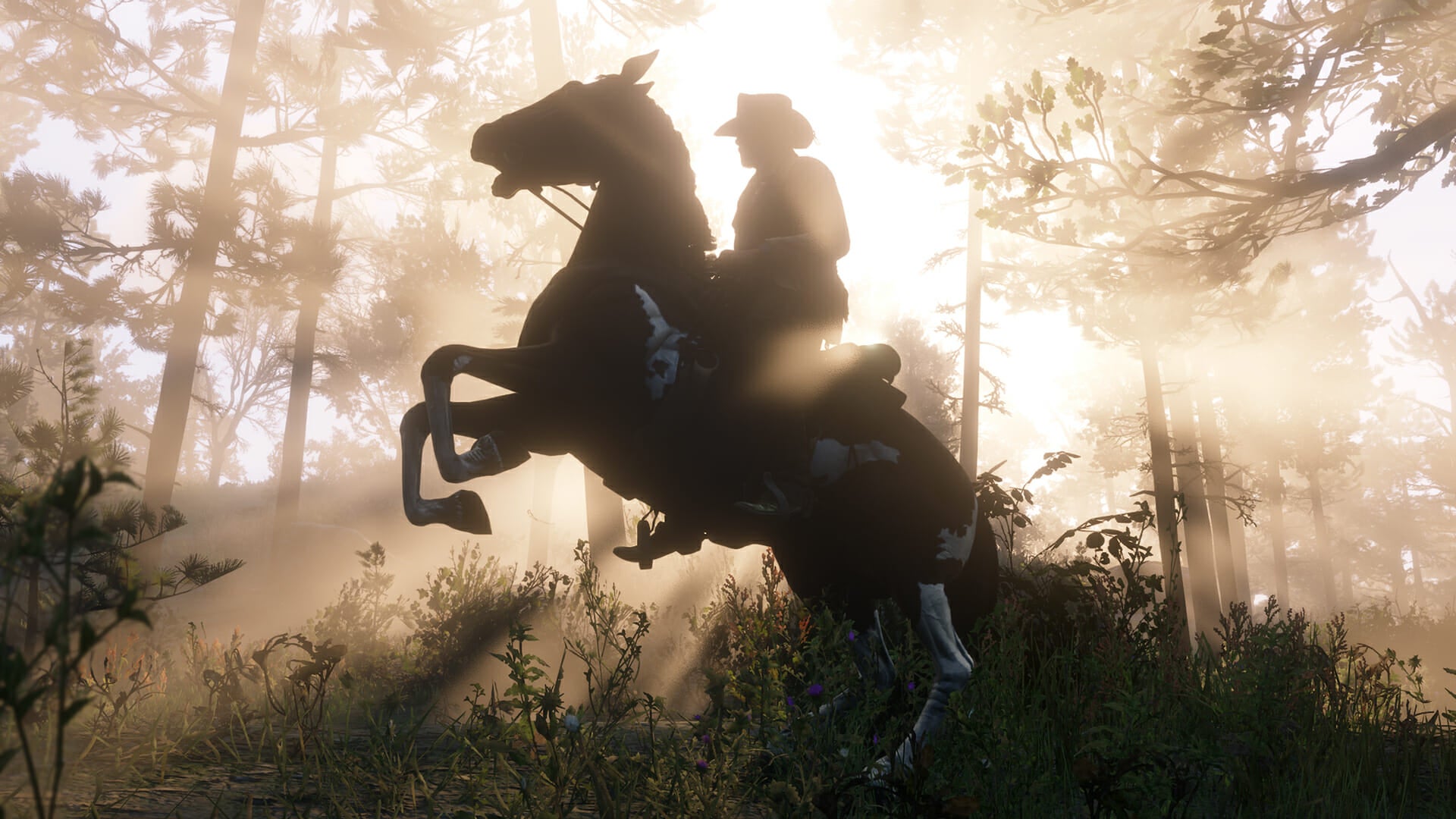
Though Red Dead 2 suffers somewhat from a cast too big for its britches, you’re given countless chances to learn what makes each character tick while wandering around camp. Hold a button, and you’re given the chance to either warmly greet or coldly antagonize your compatriots, and each offers their own unique greeting back. Characters won’t wait around for you either. They’re busy getting the stew pot ready, tending to horses, and milling about waiting for trouble. A very West Wing vibe runs through it all as someone catches you for a quick chat (although the dialogue might leave Aaron Sorkin shaking his head from time to time).
The moments where this group’s various dynamics shine the most are in some of the optional character-building scenes, such as when Dutch declares that everyone halt their work so they can celebrate the return of a lost member. You’re under no obligation to stick around, but campfire sing-a-longs and chatty poker games help remind you that you’re not just fighting for your own survival. It’s a family, for better or worse.
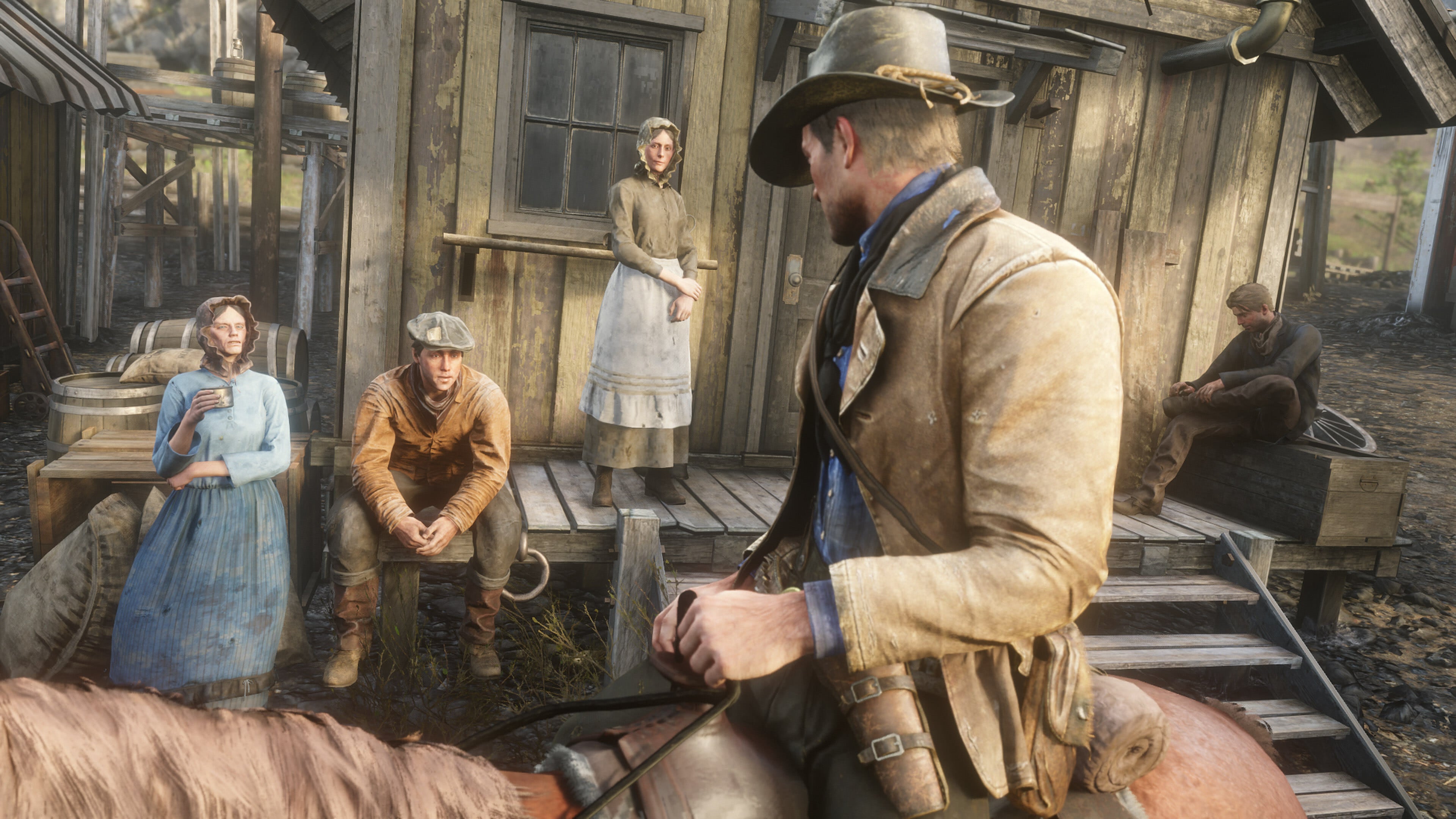
Big (video) game country
Outside the camp’s safety, there lies a world that’s both hypnotic and frightening in its scope. Dense pockets of civilization dot the landscape, their presence reminding you that nature and society are never too far from each other.
The earliest of these settlements is Valentine, the typical Western one-street town with a livestock yard, a sheriff’s office, and two rowdy saloons. All the promotional hype leading up to Red Dead Redemption 2’s release has focused on the “more”—more animations than Grand Theft Auto V, more lines of dialogue and unique citizens to meet, more interactions and building interiors. Upon your first walk into Valentine, it’ll become clear just how much “more” has been injected into Red Dead 2. Townsfolk walk with the same purpose as your fellow camp dwellers, deliberately going about their own business and dragging you into theirs with an impressive amount of natural, humanlike vigor. A quaint walk down Main Street is interrupted when two men run out the door of the saloon, ready to beat each other into the mud. A wounded veteran in Civil War attire begs at your feet and physically embraces you for your kindness. A mutt sniffs at your heels and begs for a pat on the noggin. Shopkeeps remember your face, hotel owners blanche at the way you previously left a bedroom, and drunken barflies demand to know what’s the matter after they bump into you on their way out. Everything moves with some of the most subtle poise and grace ever put into a video game.
The outer wilds are no different and, despite a lack of humanity, no less full of life. Animals claw and sniff at the edge of civilization, but once you’re deep enough into the woods, soggy bayous, or caustic deserts, it becomes clear that this is still their domain. Deer bound through the dense tree line, sunlight bouncing off of everything in sight. Wolves travel in distinct packs, circling you and your horse to strike at the most opportune moment. While cavalierly riding my steed further and further away from the established path, I crested through a particularly thick crop of plants, only to run face first into a hulking (and incredibly pissed) grizzly bear. I freely admit that the shock and awe of stumbling onto such a carnivore scared the shit out of me, on a level I hadn’t felt since trying out my first VR horror game.
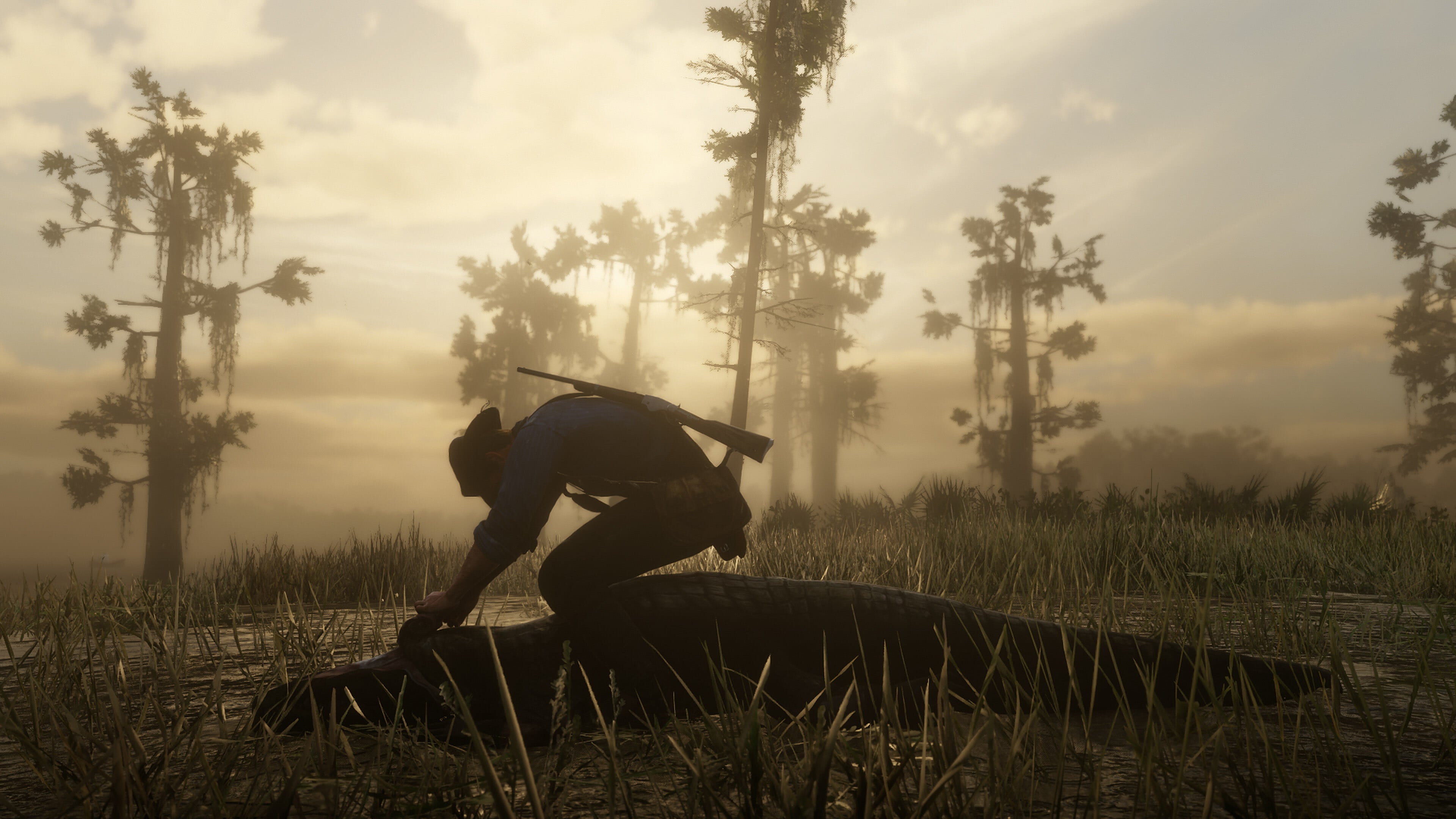
All that said, it’s fascinating how defiantly Red Dead Redemption 2 laughs in the face of other open-world games like Assassin’s Creed Odyssey. Whereas the Spartan assassin simulator is quick to fill its Greek islands to the point of literal and existential overflow, wolves and deer bounding into the middle of town and bounty hunters accosting you at every turn, Red Dead is far more comfortable, allowing you to simply bask in the emptiness that has haunted settlers for centuries. The way a river bends and merges into a gentle creek, or how a plateau punctuates the horizon forever, or how a sea of grass rolls like waves as you gallop by: All of it combines to make you feel appropriately small, weak, and adventurous in the same breath.
Some years ago, as The Witcher III: Wild Hunt and Grand Theft Auto V HD made their mark on open-world gaming, I regularly felt compelled to spend more time just walking (not jogging, not sprinting, not horseback riding, but plain ol’ strolling) through their various landscapes. I live here, I would think. Why shouldn’t I enjoy it? The pace of those games gave me opportunity to soak it all in, even if “it” just amounted to a darkened hilltop path or inner city gas station. In Odyssey, that compulsion never felt earned. Objects and architecture were mere obstacles on the unflinchingly straight line to my next objective. While Grand Theft Auto V will always have a place in my heart thanks to my love of California, Red Dead Redemption 2 is the closest I’ve ever felt to being back in the Utah and Nevada mountains, watching mountainsides, valleys, and plateau walls pass in the distance as I willingly ambled by. If you’ve ever wondered how someone could enjoy living miles away from civilization, Red Dead Redemption 2 will show you with aplomb.
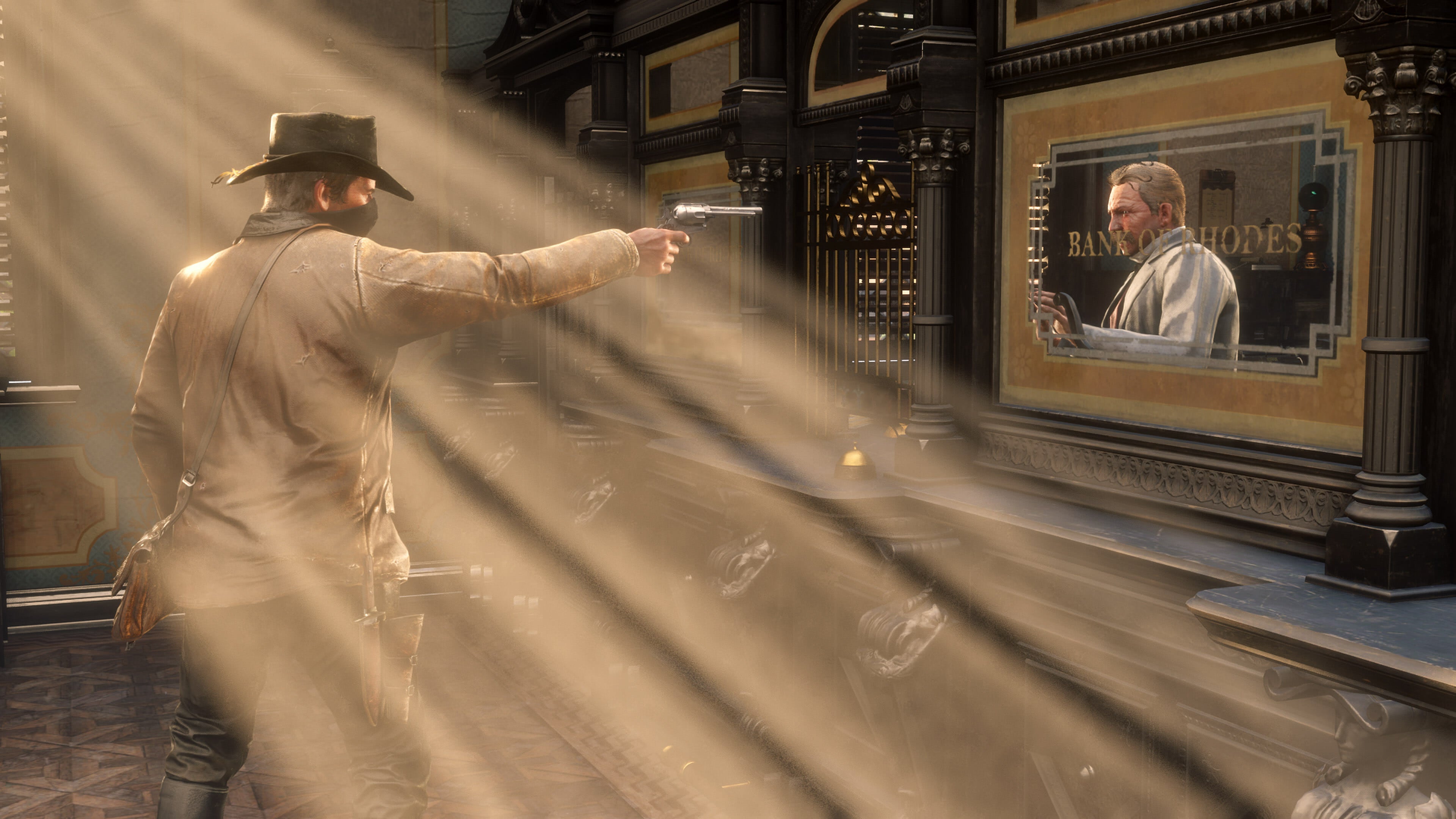
A more contextual cowboy
If there’s one thing that the original Red Dead Redemption did best among its peers, it was making those little moments when the world could either push back against you or beckon you in further. What do you do when you see a woman shrieking her head off about being attacked in the middle of the desert? How do you act when she chuckles, pulls a gun on you, and demands your horse? In the first game, the only answers were run away or pull your gun out, as outlaw code seemed to dictate.
Like the ability to approach your fellow gang members and ask how their morning is going, Red Dead Redemption 2’s greatest asset may be making the act of pulling out your gun a conscious decision all its own. By default, it’s nothing but your bare hands, and the L2 button (which is traditionally tied to aiming a gun in most games) merely brings up a couple dialogue options to approach anybody—literally anybody—with. Do you greet the fellow traveler you meet on the road with warmth, or do you antagonize them and shake them down for money? Do you defuse or escalate an already tense exchange at the saloon? It’s not until you press an entirely different button that you’ve willingly changed the dynamic, and it’s probably the most “Western” element of all: Throughout Wild West cinema, the most iconic moments have always been those sweat-inducing seconds before a pistol is drawn, not after.
And Red Dead Redemption 2 will find darkly hilarious ways to make you question what the best option is. While riding around, I was approached by a jovial gunslinger looking to see if I could beat his speed in a bottle shooting competition. With $5 on the table, why not? Like all good competitors, he quickly doubled our bet, and I fell for it like some common yankee. When the gunslinger chose to gloat just a little too hard, I flipped, pumping five shots into his chest and scooping up my lost money.
It’s hard to understate just how important this little addition feels. It’s the difference between a game that assumes killing is the default answer with one that more truly depicts the line an outlaw must toe.
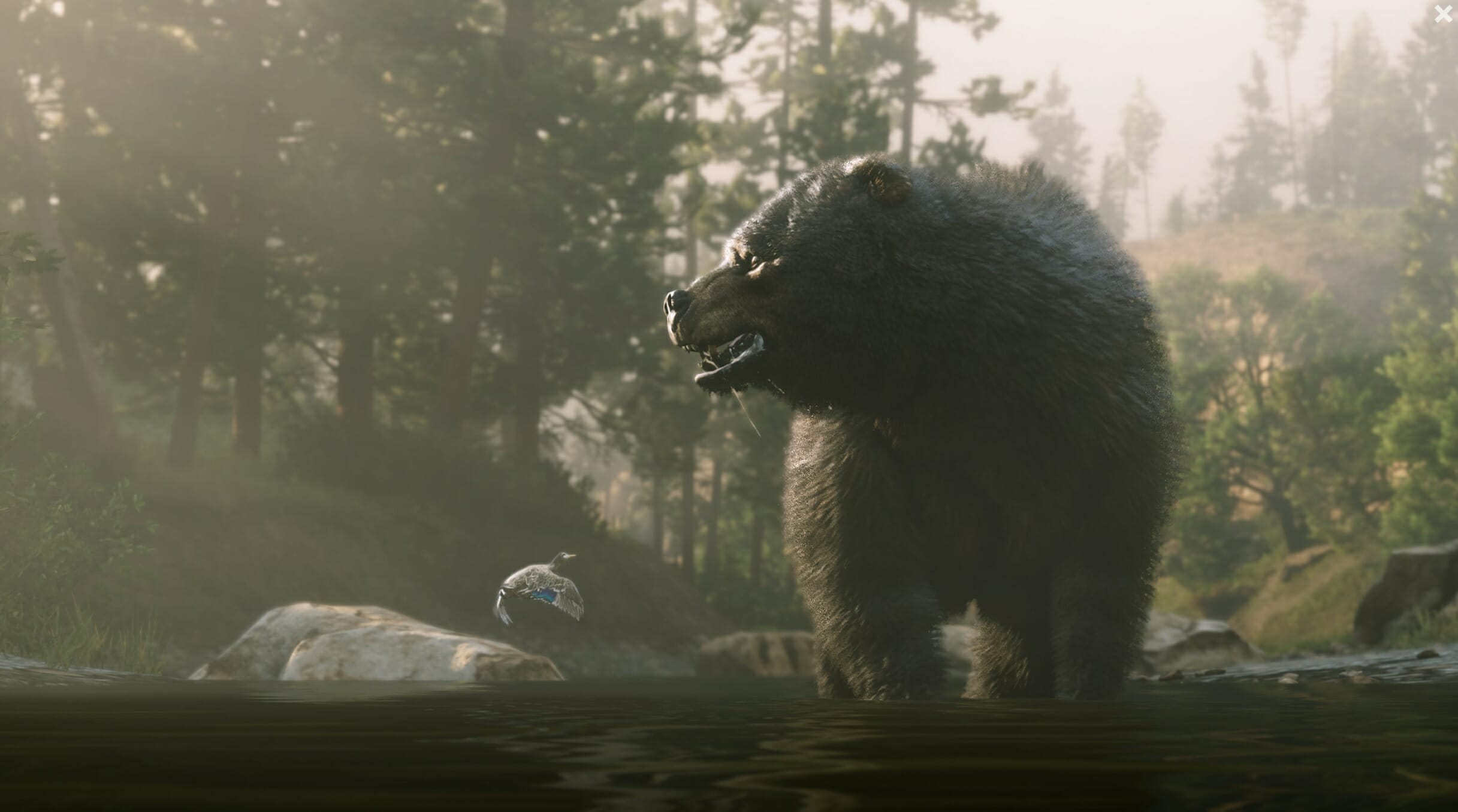
Desperado diversions
The world of Red Dead Redemption 2 will give you no shortage of opportunities to exercise that life-or-death lawlessness. Your options include games of blackjack, poker, dominoes, the digit-detaching five-finger fillet, taking in theater shows both big and small, and the ever-present story-based side quests.
These side quests will be familiar to anyone who’s played a recent Rockstar game: A colorful (if not crazed) individual meets our dear straight man Arthur Morgan and beckons him on a journey of mishaps—and likely bloodshed. A great number of these seem to be collect-a-thons, where you’ll be gathering the typical playing card collections, but some more interesting ones crop up too, like an aged professor inviting you to prove her misogynistic colleagues wrong by collecting dinosaur bones.
The more compelling of these side quests, thus far, have been just that. While hunting can be done at any time, some fellow gang members will ask if you’d like to come along on what basically amounts to a pre-determined substory, like the aforementioned Charles demanding justice against hunters who kill for fun. Semi-elaborate robberies are also on the table, and play out as their own little narratives, like a farmstead shootout with a family of awkwardly speaking hillbillies that are ripe for mockery. Like so many Rockstar games, it’s the cornball writing and scenario design that make most of these fairly memorable. It’s nowhere near as spiteful as Grand Theft Auto V’s tale of deadbeat dads and curbstomping sex criminals, but if you’ve despised Rockstar’s storytelling thus far, I doubt Red Dead will do much to change your mind.
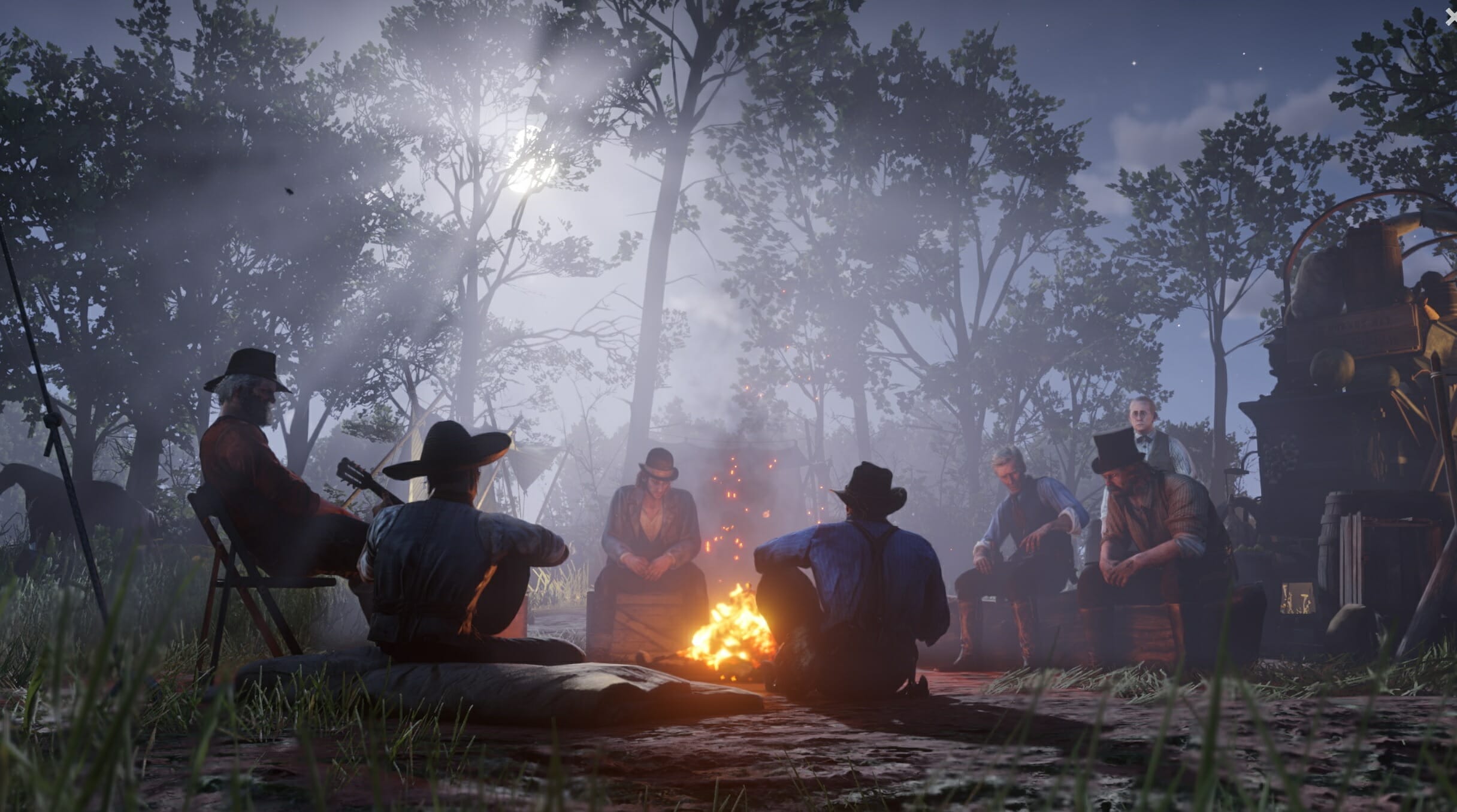
It’s been a hot minute since I’ve even thought about the original Red Dead Redemption outside of prepping for this review, but hunting feels like it’s taken a step for the better. The sheer scope of the wilds means you can spend an hour or so committing to a kill, and you’ll have to pair your all-seeing Eagle Eye (OK, maybe Ubisoft does have Rockstar’s number on some things) with your own hearing to pinpoint a wolf or bear ready to jack you up. That sense of peace and quiet as you mosey up the hill toward a better vantage point will make you feel like you’re back at home with your old man, dragging you out to the middle of nowhere for some proper bonding.
What may kill a lot of interest in pursuing some of these more extraneous missions is the sheer amount of time it can take to get to and from a location. Though you’ll eventually unlock a map for your camp that allows you to travel quickly to discovered locations, it doesn’t cover getting back, and those rolling hills are long and wide, y’all. Mix that in with all the possible diversions (hunting, roadside robbery, shopping at out-of-the-way trading posts) and it’s a recipe for frustration. Believe me, I’m the first to advocate simply getting lost and allowing a game like Red Dead Redemption 2 to breathe. I scored Assassin’s Creed Odyssey lower simply because you had zero opportunities to just take things in without a wolf or a bounty hunter mucking up your day. But it ends up being a bit much on my 40th outing, where I have to make the tough decision to haul my perfect bear hide to the frontiersman outpost for crafting or just suck it up and make my way to my actual objective. A few more stagecoaches and train stations to travel from would make all the difference, but it’s a world-building choice that’s somewhat understandable.
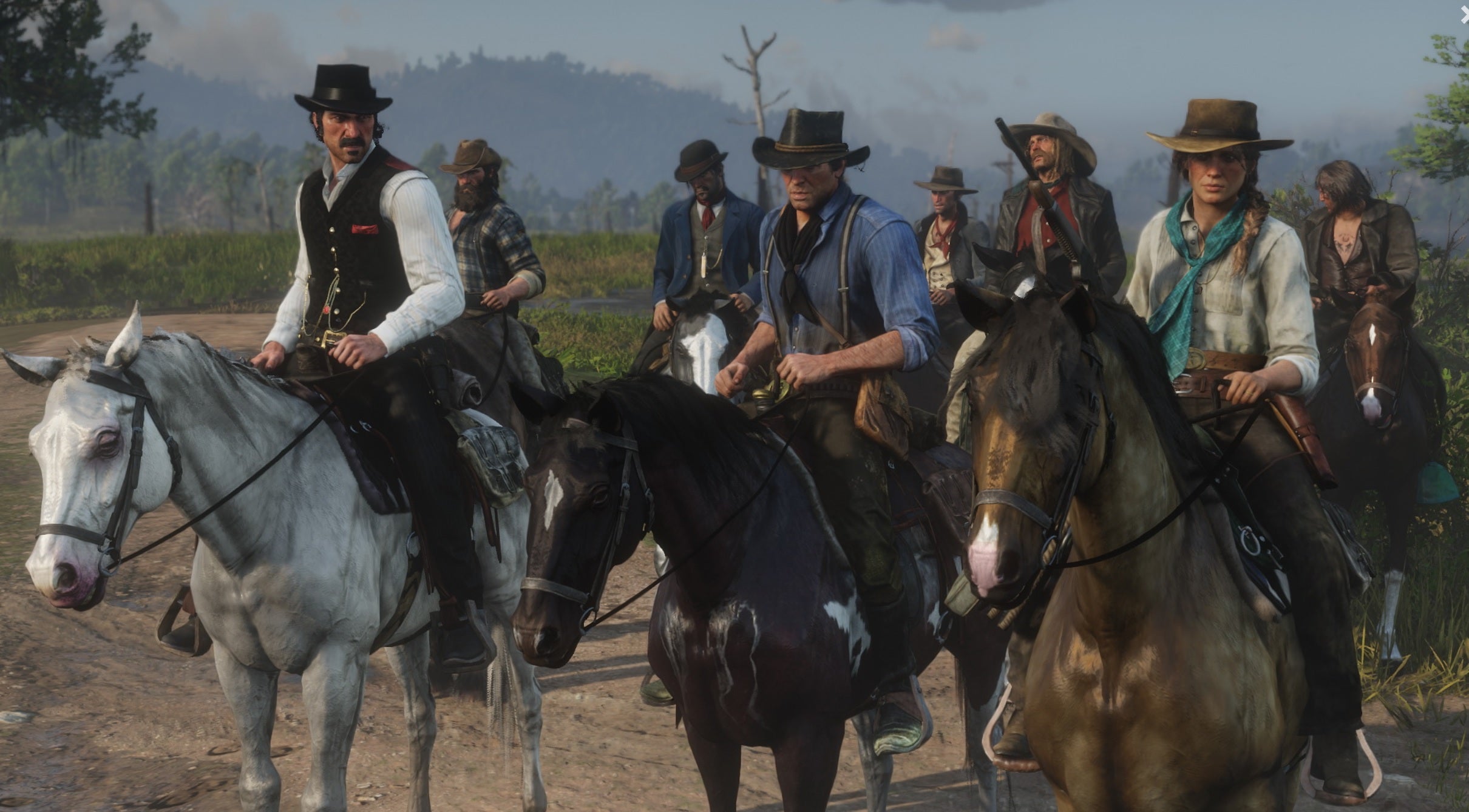
It’s high noon
Even now, I’m itching to get this review done so I can return to Red Dead Redemption 2’s vast world, of which I know I’ve only scratched the surface. I haven’t even seen its desert yet, and I’ve been hightailing it around the high plains and mountainsides for what feels like forever.
For all that bluster and hype, though, I know in my heart that Red Dead Redemption 2 has likely come at great personal cost to the people who’ve spent years building its world. Just as the countless reviews for this cowboy simulator will pontificate on how Rockstar may have just created the most “alive” world of this generation, none of it should ignore that an actual team of human beings reportedly sacrificed and struggled to breathe life into it. The question of whether or not that will impact final opinions and scores will likely depend on the critics you trust and the kind of player you are. We suspect it will still stand among Rockstar’s greatest games, but perhaps not its greatest saga.
Score: 4.5
Red Dead Redemption 2 was reviewed using a PS4 code provided by the publisher. Red Dead Redemption 2 is available Oct. 26 on PS4 and Xbox One.

